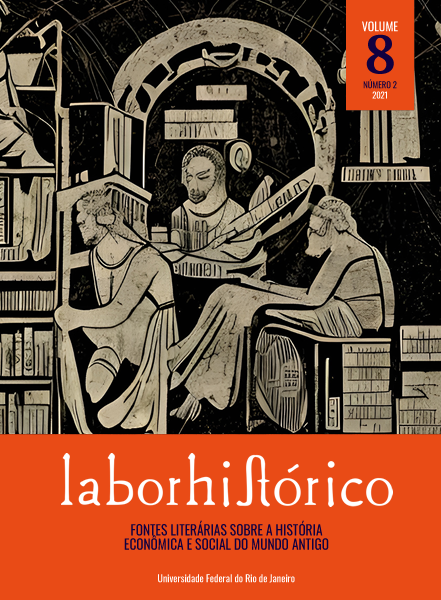A uilica entre fontes literárias e epigráficas: desvelando mulheres escravas em posições de chefia no mundo rural romano
DOI:
https://doi.org/10.24206/lh.v8i2.51047Keywords:
Escravidão romana. Economia romana. Trabalho feminino. Agrônomos latinos. Vilica.Abstract
As melhores fontes que temos para estudar as propriedades rurais da classe dominante romana, os tratados sobre o campo de Catão, Varrão e Columella, dão grande peso às hierarquias quando tratam dos trabalhadores, sobretudo quando especificam que se referem a trabalhadores escravizados. Entre as figuras em posição de chefia que aparecem nestes tratados, encontra-se uma posição especificamente feminina, a uilica. De maneira geral, esta figura recebeu pouca atenção da historiografia, sendo considerada uma posição relacional determinada pela figura do uilicus, essa sim central nas análises tradicionais sobre a economia rural romana. Nesta perspectiva, a uilica não seria nada mais que a esposa do uilicus. Os estudos da historiadora austríaca Ulrike Roth, porém, colocaram convicentemente esta premissa abaixo. Este texto busca apresentar esse debate, mostrando como novas abordagens à fontes literárias tradicionais são importantes.
Downloads
References
BEARE, Rhona, “Where Bailiffs ever free Born?”. The Classical Quaterly, Vol.28, no 2, 1978.
CARLSEN, Jesper. Vilici and Roman Estate Managers until AD 284. Roma: L’Erma di Bretschneider, 1995,
DUMONT, Jean Christian. “La villa esclavagiste ?” Topoi 9, nº 1, 1999.
EL BOUZIDI, Said “Le vocabulaire de la main-d’oeuvre dépendante dans le De Agricultura: pluralité et ambiguïté”. Dialogues d’Histoire Ancienne, v.25, no 1, 1999.
GARCIA MACGAW, Carlos. “The Slave Roman Economy and the Plantation System”. In Laura Graca e Andrea Zingarelli (org.). Studies on Pre-Capitalist Modes of Production. Leiden: Brill, 2015.
GREEN, Carin. “Free as a bird”: Varro De Re Rustica 3. American Journal of Philology, v. 118, n. 3, 1997.
JOLY, Fábio Duarte. “Espaço, poder e escravidão no De Re Rustica de Columela”. Revista Brasileira de História 23, nº 45, 2003, p.281–99.
KOLENDO, Jerzy. L’agricoltura nell’Italia romana: tecniche agrarie e progresso economico dalla tarda repubblica al principato. Roma: Riuniti, 1980.
KNUST, José Ernesto Moura. “Entre a literatura agrária latina e a economia rural romana: elementos discursivos e aspectos econômicos em Catão e Varrão”. ALÉTHEIA - Estudos sobre Antiguidade e Medievo, no 1, 2017.
LARA, Silvia Hunold. Campos da Violência. Escravos e Senhores na Capitania do Rio de Janeiro 1750-1808. Rio de Janeiro, Editora Paz e Terra, 1988
MARÓTI, Egón, “The Vilicus and the Villa-System in anient Italy”. Oikumene, vol.1, 1976.
MARZANO, Annelisa, Roman Villas in Central Italy. A Social and Economic History. Leiden e Boston: Brill, 2007.
SCHEIDEL, Walter. “Free-Born and Manumitted Bailiffs in the Graeco-Roman World”. The Classical Quaterly, Vol.40, no 2, 1990.
REAY, Brendon. Agriculture, Writing, and Cato’s Aristocratic Self-Fashioning. Classical Antiquity, v. 24, n. 2, 2005, p. 331–361.
ROTH, Ulrike. “Inscribed Meaning: The Vilica and the Villa Economy”. Papers of the British School at Rome, vol.LXXII, 2004.
ROTH, Ulrike. Thinking Tools: Agricultural Slavery Between Evidence and Models. London: Institute of Classical Studies, School of Advanced Study, University of London, 2007.
ROTH, Ulrike. “To have and to be: food, status and the peculium of agricultural slaves”. The Journal of Roman Archaeology, vol.18, 2005.
SEERGENKO, M.E., “Vilicus”. In: Izabela Biezunska-Malowist (org.), Schiavitù e Produzione nella Roma Repubblicana. Roma: L`Erma di Bretscheneider, 1986
TREVIZAM, Matheus. Linguagem e Interpretação na Literatura Agrária Latina. Tese de Doutorado, Universidade de Campinas, 2006.
Downloads
Published
Issue
Section
License
Authors who publish with this journal agree to the following:
a. The authors hold copyright of the published papers; authors are the sole responsible party for published papers content; the published paper is licensed under a Creative Commons Attribution-NonCommercial 4.0 International License which allows the sharing of the publication as long as there is acknowledgement of authorship and publishing by Revista LaborHistórico.
b. Authors should seek previous permission from the journal in order to publish their articles as book chapters. Such publications should acknowledge first publishing by LaborHistórico.
c. Authors may publish and distribute their papers (for example, at institutional repositories, author's sites) at any time during or after the editorial process by Revista LaborHistórico.


